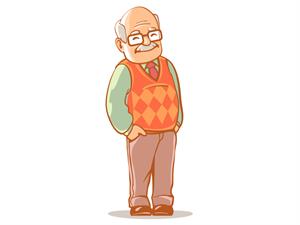
PUMPA - SMART LEARNING
எங்கள் ஆசிரியர்களுடன் 1-ஆன்-1 ஆலோசனை நேரத்தைப் பெறுங்கள். டாப்பர் ஆவதற்கு நாங்கள் பயிற்சி அளிப்போம்
Book Free DemoErnest was a young man known primarily for his hard work and simplicity, and he went unnoticed by his valley neighbours when the story ended in "The Great Stone Face I". On the other hand, Ernest was a well-known figure in "The Great Stone Face II", known to everyone in and around the Great Stone Face Valley.
In Part II of Great Stone Face, Ernest had grown up to be a grey-haired old man. The author says he'd gained so much wisdom and knowledge over the years. The author also claims that his wise thoughts outweighed his white hairs.

Ernest in his old age
During such an old age, a large number of people travelled from far to meet Ernest. Ernest's reputation had spread well beyond the valley's borders. Despite the fact that he had never sought or desired fame, it came to him on its own. He became a well-known and well-liked figure across the world. Even university professors and men from cities travelled vast distances to interact with such a noble person (Ernest).
Those who pay him (Ernest) a visit may expect a warm welcome. When visitors arrive, Ernest would generally stretch his magnificent hands. His age, which is marked by wisdom and experience, allowed him to easily connect with them, expressing heartfelt views. Ernest had established himself as a man of honour, intellect, and simplicity in the valley.
Ernest heard about a new poet whose poetic themes drew him the most in his older years. The poet, like Ernest, was born in the Great Stone Face Valley but grew up in other cities. During his stay, he had been disseminating his spirit through his sweet poems throughout those places he stayed.
As a native of the valley, the poet has not forgotten to include The Great Stone Face's beauty and significance in his poetry. Ernest read the poet's works at the end of each day's labour. Ernest used to sit on a bench before his cottage door and lift his eyes towards the mountain while reading those poems. Ernest was a big fan of the poet's works. The poem's themes have overwhelmed him. This led him to believe that the poet was a resemblance of The Great Stone Face. As a result, he posed the same inquiry to the mountain. After asking such a query, the Great Stone Face appeared to smile at him.
Ernest yearned to see the poet, and the poet, in turn, yearned to see Ernest. Just as Ernest was captivated by the poetry he had written, the poet was fascinated by Ernest's knowledge and simplicity. Despite the fact that they resided in different parts of the city, their desire to meet each other may have originated from common thoughts.
Ernest had a vision of the poet as a noble person, and the poet had a vision of Ernest as well. Ernest's simplicity, dignity, and compassion, as well as his wisdom, were all things that he pondered. Ernest was a nice, friendly man who was always willing to offer passers-by a spot to sit and rest. The poet was eager to meet Ernest, so he went to Ernest's residence one summer day. When the poet arrived at Ernest's house, he found him reading his (the poet's) book and staring at the Great Stone Face in the midst of it.

Ernest-reading the poet's book
The poet initiated a conversation with Ernest by introducing himself as a traveller without revealing his identity and asking for a night's stay at his house.
Ernest gladly accepted his request as a benevolent person, but his intuition was able to detect something related to the Great Stone Face in the new visitor's appearance. The poet said, smiling, that he had never seen the Great Stone Face greet a visitor with such kindness and courtesy.
The poet was ecstatic at the chance of meeting him (Ernest). He hasn't yet revealed his identity to Ernest. On the bench, he sat next to him. They started talking on that bright and beautiful afternoon. Despite the fact that the poet had heard about Ernest previously, he had never seen him. The poet enjoyed their meeting because it fulfilled his expectations and delighted him. This is likely due to the poet's lack of experience conversing with such a gracious, intelligent, and benevolent individual. Ernest, on the other hand, was stunned as he listened to the poet's talk.
Ernest had the distinct impression that The Great Stone Face was listening to him as he began speaking with his visitor. The poet's words had a profound effect on him, as his words reminded him of his beloved mountain. This prompted him to inquire about his adored visitor's identity.
Ernest had the distinct impression that The Great Stone Face was listening to him as he began speaking with his visitor. The poet's words had a profound effect on him, as his words reminded him of his beloved mountain. This prompted him to inquire about his adored visitor's identity.
At that point, the poet decided to disclose his true identity. He pointed to the book Ernest was holding and introduced himself as the book's author.
Ernest has been waiting for a person who looked like The Great Stone Face for all of his life. His wish for the prophecy to come true was yet to be fulfilled. Over the years, Ernest was captivated by the poet's poems because they convinced him that he had finally discovered the ideal person he had been searching for. It made him (Ernest) believe that the poet was the one he had been looking for all these years. However, not even the poet was able to meet his expectations.
Ernest described the situation to the poet when asked why he was unhappy. Ernest had high hopes for the poet, believing that he would be the ideal match for the legend told by his mother. He was disappointed since his hopes had been crushed.
Ernest described the situation to the poet when asked why he was unhappy. Ernest had high hopes for the poet, believing that he would be the ideal match for the legend told by his mother. He was disappointed since his hopes had been crushed.
The poet well-understood the reason behind Ernest's grief. He attempted to comfort Ernest by sharing some truths. To begin with, the poet accepted the reality that he did not resemble the Great Stone Face as he lacked the noble characteristics of it and felt undeserving of it. Ernest, on the other hand, was not convinced. Ernest was moved by the poet's thoughts in his book, and he considered the poet to be similar to The Great Stone Face. But, he couldn't comprehend the resemblance between the poet's visage and the Great Stone Face. "Are not those thoughts worthy?" he asked the poet, pointing to his book.
As Ernest grew increasingly dissatisfied, the poet began to describe the essence of his poetry, describing them as "heavenly music from afar." As a result, they cannot be a true representation of the poet's ordinary life. There was always a distinction between real and imaginary (dream life).
The poet's views in the poem did not match his reality. The poet confessed to Ernest that he himself has a lack of faith in his thoughts. As a result, the poet felt certain that he did not do justice to the resemblance of such an ageless face (The Great Stone Face). Despite the fact that the poet had a vast number of dreams, they remained just dreams for him. As a result, nothing had actually occurred.
As Ernest grew increasingly dissatisfied, the poet began to describe the essence of his poetry, describing them as "heavenly music from afar." As a result, they cannot be a true representation of the poet's ordinary life. There was always a distinction between real and imaginary (dream life).
The poet's views in the poem did not match his reality. The poet confessed to Ernest that he himself has a lack of faith in his thoughts. As a result, the poet felt certain that he did not do justice to the resemblance of such an ageless face (The Great Stone Face). Despite the fact that the poet had a vast number of dreams, they remained just dreams for him. As a result, nothing had actually occurred.
The poet also explained Ernest that someone like Ernest, who lives in reality with compassion and honesty, might not be able to notice the likeness of the Great Stone Face in a person like the poet since the poet's thoughts did not correspond with his practical life.
The poet explained the real facts mentioned above to Ernest in a sad tone, with tears in his eyes. Ernest's eyes were also filled up with tears after listening to the poet's explanation.
The conversation between the poet and Ernest came to an end around sunset. Ernest got right to work, as usual. He would go around to his neighbours every evening. Ernest has always shared what was in his thoughts and his heart with his neighbours during his talk with them.

Ernest and the poet- walking towards Ernest's neighbours
The poet and Ernest reached a point where The Great Stone Face could be seen clearly. Ernest's neighbours had been anticipating to see the lovely, pleasant face every day. Ernest had brought the poet along and began speaking to the crowd (neighbours).
As previously said, Ernest began to communicate to them with his ideas from his mind and heart. Ernest's style of speaking to his audience drew the poet's attention. Ernest had the manner of a preacher, and his remarks resonated with genuineness. Since Ernest's words coincided with his lifestyle, the words he uttered to others seemed to have power.
As previously said, Ernest began to communicate to them with his ideas from his mind and heart. Ernest's style of speaking to his audience drew the poet's attention. Ernest had the manner of a preacher, and his remarks resonated with genuineness. Since Ernest's words coincided with his lifestyle, the words he uttered to others seemed to have power.
Rather than the customary preaching, the poet realised that Ernest's speech was distinguished by a life of good acts and unselfish love and that it was the words of Ernest's true life.

Ernest preaching the crowd
While listening to Ernest, the poet considered Ernest's life and character to be a nobler strain of poetry than any he had ever produced. His eyes welled up with tears, and he told himself that he'd never met a man as intelligent, and kind as Ernest, with a contemplative face framed by white hair.
The Great Stone Face, on the mountain, appeared from a great distance but at a clearly visible spot. It must have been a beautiful evening during the sun's golden hour. Clouds veiled the Great Stone Face, much as white hairs covered Ernest's head.
This lovely sight drew the attention of the poet, who was engrossed in deep thought at the time. Ernest's face, which startled the poet, had the same spectacular look as the Great Stone Face. The poet suddenly lifted his arms and exclaimed, "Behold! Behold! Ernest is himself the likeness of the Great Stone Face!".
Everyone started comparing Ernest to The Great Stone Face when they saw him. They quickly realised the poet's assertion was true. The old prophecy has now come true, as they believe they have seen the prophesied man. Despite this, Ernest refused to acknowledge that he had Great Stone Face's resemblance. He went slowly back to his house after finishing his talk, holding the poet's arm, hoping for the arrival of a wiser and better man than himself, resembling the Great Stone Face.
Everyone started comparing Ernest to The Great Stone Face when they saw him. They quickly realised the poet's assertion was true. The old prophecy has now come true, as they believe they have seen the prophesied man. Despite this, Ernest refused to acknowledge that he had Great Stone Face's resemblance. He went slowly back to his house after finishing his talk, holding the poet's arm, hoping for the arrival of a wiser and better man than himself, resembling the Great Stone Face.